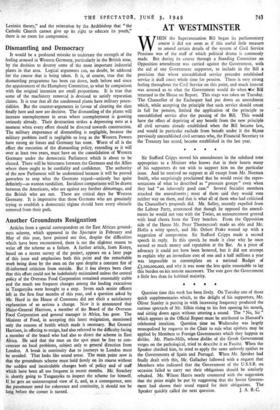AT WESTMINSTER
WHEN the Superannuation Bill began its parliamentary course it did not seem as if this useful little measure to amend certain details of the system of Civil Service Pensions was of the stuff of which political drama is commonly made. But during its course through a Standing Committee an Opposition amendment was carried against the Government, with the aid of one Government supporter, to include in the Bill a provision that where unestablished service precedes established service it shall count whole time for pension. There is very strong feeling throughout the Civil Service on this point, and much interest was aroused as to what the Government would do when *he Bill returned to the House on Report. This stage was taken on Tuesday. The Chancellor of the Exchequer had put down an amendment which, while accepting the principle that such service should count in full for pension, limited the application of the principle to unestablished service after the passing of the Bill. This would have the effect of depriving of any benefit from the new principle all civil servants already established when the Bill became law, and would in particular exclude from benefit under it the 86,000 previously unestablished civil servants who, the Financial Secretary to the Treasury has stated, became established in the last year.
Sir Stafford Cripps moved his amendments in the subdued tone appropriate to a Minister who knows that in their hearts many of his supporters do not wish to support him on the particular issue. And he received no support at all except from Mr. Norman Smith, who surprisingly proclaimed that he would resist the repre- sentations of what he described as "pressure groups" even when they had "an inherently good case." Several Socialist members attacked the amendments ; most of them said they would vote neither way on them, and that is what all of them who had criticised the Chancellor's proposals did. Mr. Solley, recently expelled from the Labour Party, announced that though he opposed the amend- ments he would not vote with the Tories, an announcement greeted with loud cheers from the Tory benches. From the Opposition side of the House Mr. Peter Thorneycroft made an able and Mr. Hollis a witty speech, and Mr. Osbert Peake wound up with a suggestion of compromise. Sir Stafford Cripps made a second speech in reply. In this speech he made it clear why lie once earned so much money and reputation at the Bar. As a piece of advocacy it could not have been bettered, but it did not attempt to explain why an immediate cost of one and a half millions a year was impossible to contemplate on a national Budget of £3,200,000,000, and why it was none the less quite reasonable to lay this burden on his remote successors. The vote gave the Government a little less than its habitual majority.
* *
Question time this week has been lively. On Tuesday one of those quick supplementaries which, to the delight of his supporters, Mr. Oliver Stanley is putting in with increasing frequency produced the curious spectacle of Mr. Silkin rising to his feet opening his mouth, and sitting down again without uttering a sound. The "No, Sir" which appears in the Official Report must be attributed to Hansard's celebrated intuition. Question time on Wednesday was largely monopolised by requests to the Chair to rule what epithets may be applied by Members to Foreign Governments which they happen to dislike. Mr. Platts-Mills, whose dislike of the Greek Government verges on the pathological, tried to describe it as Fascist. When the Speaker checked him, he tried to apply the same unlovely epithet to the Governments of Spain and Portugal. When Mr. Speaker had finally dealt with this, Mr. Gallacher followed with a request that Members who indicated that the Government of the U.S.S.R. on occasion failed to carry out their obligations should be similarly rebuked. Mr. Wilson Harris neatly countered with the suggestion that the point might be put by suggesting that the Soviet Govern- ment had shown their usual regard for their obligations. The Speaker quickly called the next question. J. A. B.-C.


































 Previous page
Previous page